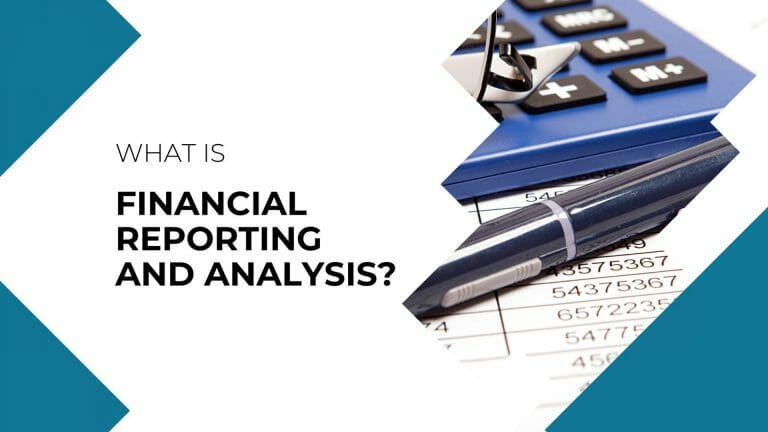Financial executives need to understand the importance and value of financial reporting and analysis. No organization can survive profitably in today’s economy without having a strong grip on the subject.
This post has discussed the insights of modern financial reporting and financial statement analysis that will help the management maximize effectiveness by making better policies for their firm.
Let’s start with the core basics.
What Is Financial Reporting and Financial Statement Analysis?
Accurately reporting financial information is an important responsibility for both internal and external stakeholders, so accounting for financial reporting is an essential part of the process. This includes revenue and expense information and details of the profit, capital, and cash flow.
The financial analysis of a company is done by units referred to as Key Performance Indicators or KPIs. Even though these key performance indicators don’t play a vital role in picturing a company’s internal organizational structure, they are still essential factors that display its financial health.
Furthermore, these indicators can help stakeholders evaluate the company’s overall health and decide to expand and compete effectively in the economy.
Benefits of Financial Reporting and Analysis
Several studies have found that gathering the data needed to make sound business decisions, such as income and expenses, working capital, cash flow, and profitability, is critical.
Following are some of how effective financial reporting and analysis tools can boost a company’s performance:
1- Real-Time Data Analysis
Making the correct decisions at the perfect time is crucial for business executives to ensure that their organization survives profitably in the crowded marketplace. Effective fp&a technologies ensure that senior management has access to Realtime information. This lets them make the most up-to-date reporting and estimates, which makes them better able to make strategic decisions.
A business executive can stay one step ahead of the competition by utilizing real-time visibility and analysis. They can also use opportunities to expand and invest in areas that their competitors might otherwise overlook.
2- Effective Debt Management
Debts can badly affect the success of any company’s operations. For this reason, corporations should focus on debt management in order to maintain long-term profits.
Financial reporting strategies make it easy to monitor the receivables and payables accounts and expenses and revenue summaries. This transparency makes it easier for executives to plan debt management, ensuring that they effectively utilize every penny spent on their debt repayment.
3- Utmost Compliance
Using the right tools for analyzing a company’s financial statements ensures that it complies with international financial accounting standards. Complying with the international financial reporting standards such as GAAP and IFRS guarantees that a company’s financial statements depict complete and accurate financial data.
4- Cash Flow Management
Unanticipated market disruptions leading to cash flow problems can destroy a business’ operations. According to estimates, cash flow issues are the main cause of the failure of 82 percent of all small enterprises.
And not just cash flow availability, but even cash flow management has caused many businesses to collapse. In fact, a 2020 study by the International Labor Organization shows that cash flow management was the most serious threat to businesses in the pandemic situation.
Accurate analysis can help yield accurate KPIs, which can help executives in better identifying their revenue stream structure. They can thus make better strategies to ensure they make timely investments.
5- Optimum Financial Performance
Financial reporting and financial statement analysis provide firms with long-term benefits. They assist leaders in identifying opportunities to improve the efficiency, quality, and speed of their company’ operations through process modification.
6- Reduced Risk
A business that has the most up-to-date, accurate information can better protect itself from risks. Executives benefit from financial reporting insights because they can foresee changes in market conditions and supply networks. They can, in turn, make contingencies that work well.
Moreover, upper management can timely identify inefficiencies in their financial operations. This keeps them better positioned to overcome these technical flaws by using artificial intelligence, automation, and advanced procedures.
KPIs like Return on Assets, Return on Equities, Operating Expenses Ratio, Gross Profit Margin, Net Profit Margin, and Working Capital are essential factors to consider when aiming to mitigate risk.
7- Strengthened Supplier-Customer Relationship
The majority of everyday business transactions nowadays are conducted on a credit basis. This helps business people to make a profit out of their purchases before paying out for them.
Financial metrics make it possible for businesses to pay bills on time. This strengthens the supplier-customer relationship and entitles the clients to incentives such as early payment discounts.
Moreover, customers may even gain the trust of suppliers and be in a better state to request delayed payments in case of market disruptions.
Four Types of Financial Statements Every Company Needs
Regardless of the scale of operations, every business that wants to operate profitably must keep these four types of financial statements to monitor their finances:
Balance Sheet
Balance sheet statements provides an overview of a company’s total assets and equities (liabilities and capital) over a year. Also known as a statement of net worth or a statement of financial position, a balance sheet provides executives data to calculate important financial ratios.
Income Statement
A balance sheet focuses on the three core nature of accounts in accounting: assets, liabilities, and capital. An incomes statement is a financial statement that provides a snapshot of the remaining two titles – expenses and revenues. It is also known as an expense and revenue summary or a profit and loss statement, shows a business’ operating and non-operating expenses and revenues for a year.
Cash Flow Statement
A cash flow statement is a crucial accounting statement that showcases how a business manages its cash flow. Prepared on an annual basis, a cash flow statement or a statement of changes in financial position enables stakeholders to analyze whether or not a business is generating sufficient cash to meet its obligations and pay off its expenses.
Statement of Owner’s Equity
According to the GAAP or IFRS principles, the last most important financial statement that all businesses must maintain is a statement of owner’s equity. A statement of owner’s equity lists the allocation of the retained earnings of a business. It depicts the overall financial health of a company by showcasing whether the business uses its retained earnings profitably – by reinvesting it or resourcefully – to pay off its debts.
Importance of Financial Reporting and Analysis for a Business
We have reviewed the four primary financial statements and the benefits of financial reporting and analysis. Another critical point to discuss in this article is the importance of business financial reporting for a corporation.
1- For Taxation and Audits
Financial analysis is most important for a business to assist with tax payments. The government uses financial statements to ensure that a company is paying its due share in taxes. Moreover, the government appoints independent auditors to recheck a company’s accounts to ensure no fabrication. Therefore, unless an executive wishes for their firm to go bankrupt due to auditors being unable to locate proper financial accounts and reports, they should develop efficient financial statement maintenance strategies.
2- For Stakeholders and Investors
No one invests in a company without thinking about its profit-generating capacity. Corporate investors, in particular, do not invest their money in a company based on the advertisements that it produces. This is where financial reporting and financial statements come in!
Furthermore, financial statements and analysis also play an important role in keeping stakeholders well-informed of their business operations by disclosing the current position of assets, equities, and liabilities.
3- For Decision Making
The latest insights on a company’s finances are important for business executives to develop effective business strategies. If the financial reports are inaccurate, the strategies developed will be based on a shaky platform, increasing risk.
Related :Guide to Budgeting and Reporting
Enhance the Strategic Value of Businesses with Effective Financial Reporting and Analysis!
In the present times, accurate and current data analysis is the most valuable weapon a company has. Businesses that have access to up-to-date, correct information have the edge over their competitors in the market. For business executives to ensure that their firm is acquiring the precise KPIs, investing in the appropriate and contemporary financial reporting solutions is the right direction to go.
With the help of a financial reporting software, they will enhance the strategic value of their business while improving its performance, assuring optimum compliance, and providing stakeholders with sufficient knowledge they need to finance the business



